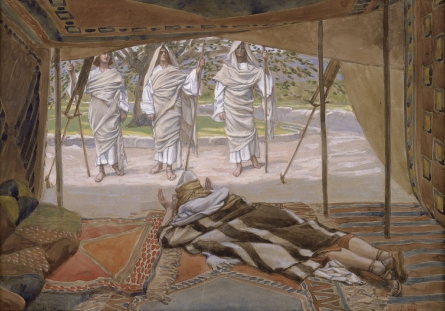“Va’yera” and G-d appeared to him
The Jewish belief in angels goes as far back as the Book of Genesis. Angels appear throughout the Bible. In their earliest appearances, they function as bearers of information. In Genesis, an angel appears to Hagar, Sarah’s maidservant, and informs her that she will bear a son whose descendants will be numerous.

A similar encounter happens later with Sarah herself, the three angels disguised in the form of humans told Avraham that Sarah would give birth the following year, Sarah laughed at this blessing (Bereishit 18:12) as she found it hard to believe she could give birth at the age of ninety.

When Avraham sets out later to sacrifice that child, his son Isaac, it is an “angel of G-d” that cries out to him and instructs him not to harm the boy. Some Talmudic sages teach that Isaac was an adult at that time, 37 years old to be exact!

The Three Angels
The Parasha begins with G-d visiting Avraham following his circumcision at the age of 99 (Bereishit 17:24). The third day after a circumcision is reported to be the most painful day; however G-d visited Avraham on the third day to show him honor for having carried out the commandment and also to acknowledge that he had now been elevated to higher spiritual plateau.

Hospitality
Despite the painful wound, Avraham yearned so greatly to have guests that he sat outside his tent, waiting for the arrival of guests so that he could bring them into his house for a meal. In response G-d sent him three angels in the guise of people, and Avraham ran to greet them and personally serve them (Bereishit 18:2). He also encouraged his son Ishmael into service, for the education of the youth must be practical; preaching about acts of kindness will fail to achieve the ideal result unless it is accompanied by acts of kindness.
During the time he was attending to his guests, he implored G-d not go away from his presence, as he was always seeking the divine presence throughout the day, he realized the necessity of being hospitable towards guests, which goes with the saying from the Talmud that ‘hospitality to wayfarers is greater than receiving the divine presence.’ (Shevuot 35b).
Hachnasat Orchim
R’ Yaakov Yosef z”l (1843-1902; Chief Rabbi of New York) writes: “We also learn from here that there is a mitzvah of doing kindness even toward someone who is not in need.” This stands in contrast to the mitzvah of tzedakah, which is fulfilled only if the recipient is in need. Avraham’s guests were angels, and angels have no needs. Yet, Avraham left the presence of the Shechinah to care for them. Will you argue that Avraham did this only because he thought the guests were human? This cannot be, for G-d would not have caused Avraham to unknowingly do what he would not have done willingly had he known that his guests were angels. (Avraham would not have stopped speaking to G-d to do something which was not a mitzvah, for example, giving tzedakah to those who are not needy.) Rather, the mitzvah of hachnassat orchim applies even if the guests do not need hospitality. Also, we are taught that Avraham excelled in the mitzvah of hachnassat orchim.
‘Love thy neighbor like yourself’
Why was he attached to this mitzvah in particular? Chazal teach that Avraham was the first person to call G-d, “Adon” / “Master.” Avraham recognized that G-d is our Master and we are his servants. This is the reason for Chazal’s teaching that no reward for mitzvot is given in this world. We are all servants, and we serve without pay. This means that G-d cares for us whether we are “rich” in mitzvot or “poor” in mitzvot. Avraham’s hachnassat orchim emulated that of G-d, who cares for all of His “guests” without regard to their need for charity. A person who does the mitzvah of having guests, hachnasat orchim, fulfill more than one mitzvah; it is included in the mitzvah a of ‘love thy neighbor like yourself’ because we would like others to offer us meals or lodgings at times of need.
Having Guests, A Great Mitzvah
It is also a fulfillment of the mitzvah to ‘go in the ways of G-d’, which teaches us that we should strive to emulate G-d’s character traits and actions. Although there is no specific incident in the Torah in which G-d, hosted people for a meal, it seems that G-d is constantly hosting the entire world, offering us a place to sleep and food to eat! Thus, being hospitable to others is a way of emulating G-d.
This mitzvah is considered so great that it is placed on an equal level of going early to learn Torah. Learning Torah is, in many ways, the most important mitzvah in the Torah because it enables us to keep all the mitzvot and to develop a relationship with G-d. Nonetheless, having guests is considered as great a mitzvah as getting up early to learn Torah!
Moreover, the Rabbis teach that having guest is even greater than being exposed to the Divine Presence! We learn this from the behavior of Avraham Avinu when G-d visited him after his circumcision. In the midst of reveling in G-d’s exalted presence, Avraham sees three strangers approaching. He suddenly excuses himself from G-d’s presence to speak to the strangers and offer them a meal! There is no allusion in this incident that Avraham did anything wrong, and therefore this teaches us that it must be greater to have guests than communicate directly with G-d! The reason for this is that, being like G-d is an even greater way of connecting to G-d than speaking to G-d!
The righteous say little and do a lot
Avraham told the guests that he would give them ‘little bread and water’ however he served them a huge luxurious meal, a principle the Talmud states, that ‘the righteous say little and do a lot. (Bava Metzia 87a). G-d loved and singled out the Patriarchs and Matriarchs of the Jewish religion. They were of the most exceptional people. We are blessed with the opportunity to know of them and emulate their deeds and attitudes. We connect ourselves to them by emulating them, and we thereby connect ourselves to the relationship they had with G-d. Kindness is the way of Avraham. It is the path to true spirituality. A Torah student understands that spirituality is not a result of transcending the physical world, but rather living as part of the world in an elevated fashion. What a privilege it is to be able to have a share in the heritage of such people.
Welcoming Guests During Covid 19
Soon we will enter the ninth month of our new reality, where people are afraid to connect with one another in-person. Where even “Father of The Bride” George was invited to his son’s zoom wedding. https://www.youtube.com/watch?v=zBXL_jSxLuE
Let’s take our cue from Avraham and open our homes, even when you feel there are no options, zoom can be a great way to welcome family and friends into your home, start connecting and sharing the best of what we have with others, our time. In doing so we will enrich our lives and continue to make a kehillah k’doshah, a holy community. Shavua Tov.

Check out YedidYah “Let There Be Light” a song about The Story of Creation. Music and Lyrics by Rabbi Yakira Yedidia https://www.youtube.com/watch?v=H0GEYQYwDI0
#####
This blog article was inspired by chabbad.org

